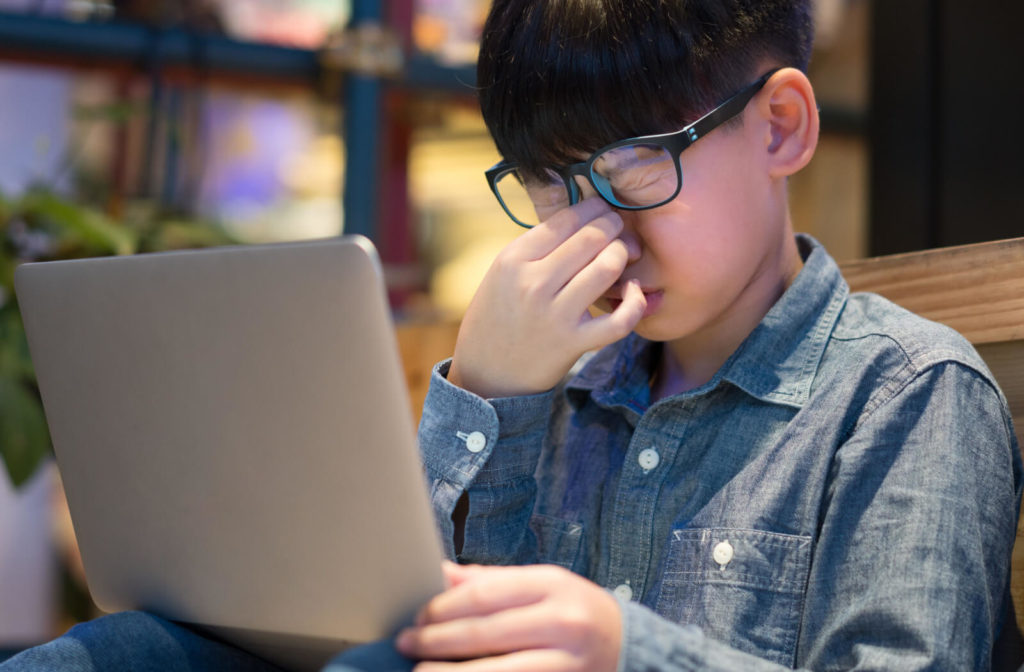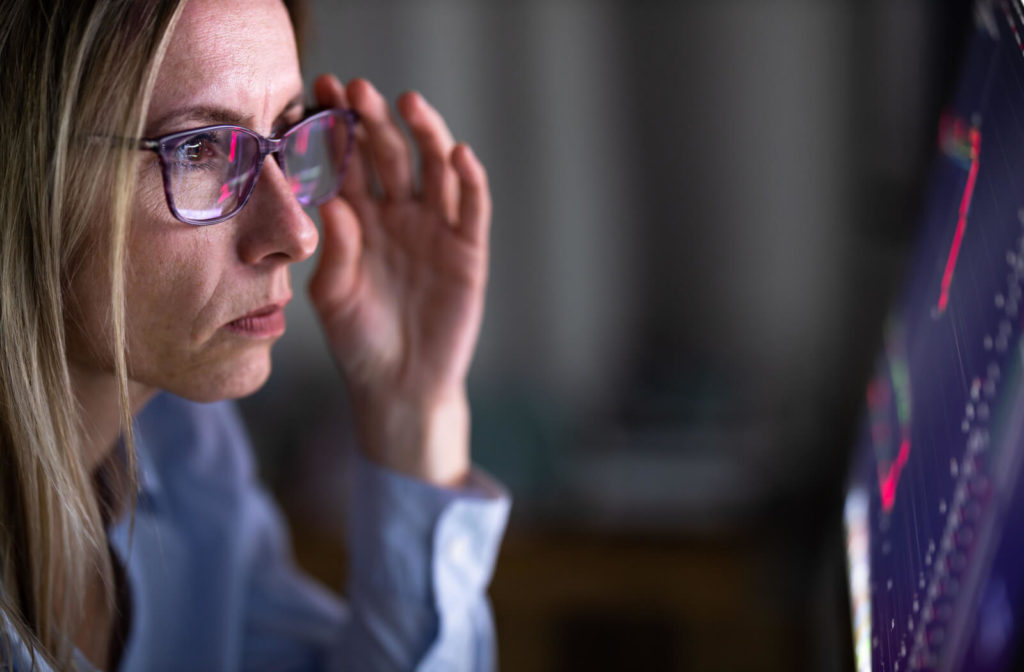In today’s world of smartphones, computers, television, and tablets, we spend hours every day staring at screens. With that comes the obvious question, is it harmful?
Through all this screen time, we constantly expose ourselves to blue light, a type of high-energy visible (HEV) light emitted from electronic devices. Blue light glasses block this blue light from reaching our eyes.
Blue light glasses may reduce the amount of eye strain from staring at computer screens. One of the symptoms of digital eye strain can be dry eyes. Eye health experts are still unsure if blue light damages your eyes, but there’s no harm in wearing blue light-blocking glasses.
If you’re experiencing any symptoms of eye strain or dry eyes, an eye exam can help your optometrist uncover if digital devices are to blame or if it’s another condition.
What Is Blue Light?
Blue light is a type of light with a wavelength between 400–500 nm. Many of our common backlit digital devices emit it, which has been a concern for researchers since we’re using more LED screens in our daily lives.
However, screens aren’t the only source of blue light. The visible colors of light are all around us. In fact, the sun emits far more blue light than any of our screens do. Blue light can also come from fluorescent lights and LED bulbs.
Blue light also has some benefits; It can help with alertness and boost cognitive function. However, since blue light mostly comes from the sun, it can also affect our circadian rhythm. The circadian rhythm is our wake and sleep cycle, and too much blue light at night can make it harder to get to sleep. Instead, consider limiting your screen time before you go to bed or use nighttime settings on your devices that reduce blue light.
How Do Blue Light Glasses Block Light?
Blue light glasses are designed to block blue light through special coatings applied to the lens. This coating may stop blue light from reaching your eye and is believed to reduce eye strain.
While there isn’t any evidence proving that blocking blue light will reduce eye strain, one study found that exposure to blue light might reduce visual acuity (the measure of how well you can focus on an object) in people with unstable tear film. By limiting exposure to blue light, patients with dry eyes saw significant improvement in their vision.

Digital Eye Strain & Dry Eyes
While there’s no evidence that blue light from digital screens can cause eye disease, that doesn’t mean it has no effect on you. All visible light scatters when it hits an object; that’s how we see color. Blue light, though, scatters easier than other colors, which can make it difficult for your eyes to focus.
In this case, you may see blue light as a form of visual static. Eye health experts believe this effect might be why blue light could be related to eye strain.
Blue light exposure might also be a part of a larger condition. People who use blue light-emitting digital devices up close or for prolonged periods are susceptible to digital eye strain, also known as computer vision syndrome. Some of the symptoms of digital eye strain include:
- Dry eyes
- Sore eyes
- Blurry vision
- Headaches
- Neck and shoulder pain
People experience digital eye strain differently, and how it affects you can depend on already present eye conditions.
The reason our eyes dry out while using digital screens is a simple one: we blink less. Whenever we blink, we’re spreading our tears across our eyes, allowing our tear film to keep our eyes healthy and comfortable. When we’re hyper-focused on a screen, we aren’t blinking as much, and the tear film can dry out.
If you’re already dealing with chronic dry eye symptoms, this reduction in blinking can lead to irritation, redness, and pain.
Preventing Dry Eye Symptoms
For people dealing with visual impairment due to dry eyes, blue light glasses might help your visual acuity. However, blue light glasses can’t directly address the underlying cause of dry eyes. Your optometrist can help uncover the cause of your dry eyes and offer treatments that may alleviate your symptoms, such as LipiScan or LipiFlow to treat blockages.
There are steps you can take to limit your exposure to bright blue light that may reduce digital eye strain and any resulting dry eyes:
- Practice the 20-20-20 method: While using a blue light-emitting device, ensure you take a break every 20 minutes to focus on an object 20 feet away for 20 seconds. The specific distance doesn’t matter as much as long as you take a moment to look away from your screen.
- Use artificial tears: Artificial tears are a type of eye drop that you can use to supplement the natural tears produced by the eyes. They’re available over the counter and can help to soothe dry eyes.
- Increase humidity: Dry air can exacerbate dry eyes, so increasing the moisture in your home or workplace can help to reduce symptoms.
- Place your screen properly: A computer screen should be 20–28 inches away from your eyes and about 4 or 5 inches below eye level. Also, ensure you’re not getting any glare from lighting or windows. If this isn’t possible, consider anti-glare screen filters.
Protecting Your Vision
With the help of blue light glasses, you may be able to reduce the amount of blue light entering your eye from digital screens. While this could help you sleep better, the jury is still out on if they can reduce eye strain. However, they appear to improve visual acuity in people with dry eyes, which is a good sign.
If you spend a lot of time working at a computer and are dealing with eye strain and dry eyes, you may want to try them to see if they improve your symptoms. Not only can our team at Perspective Eye Center help you decide on a blue-light-blocking product, but we can also help determine the cause of your dry eyes.
Don’t let dry eyes ruin your screen time. Book an appointment today!



